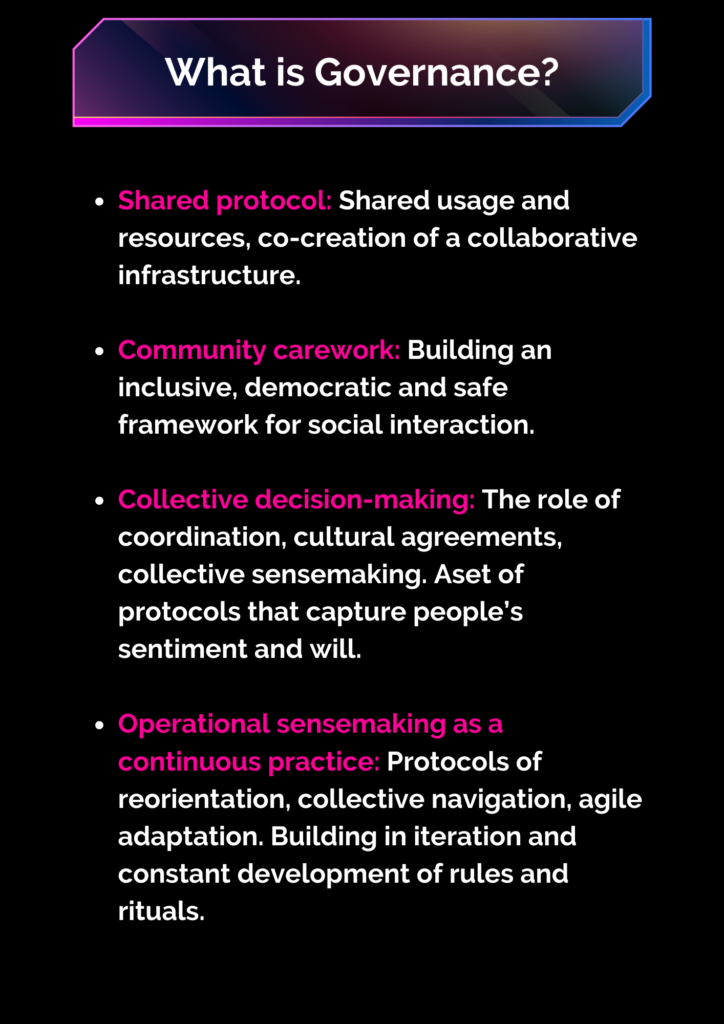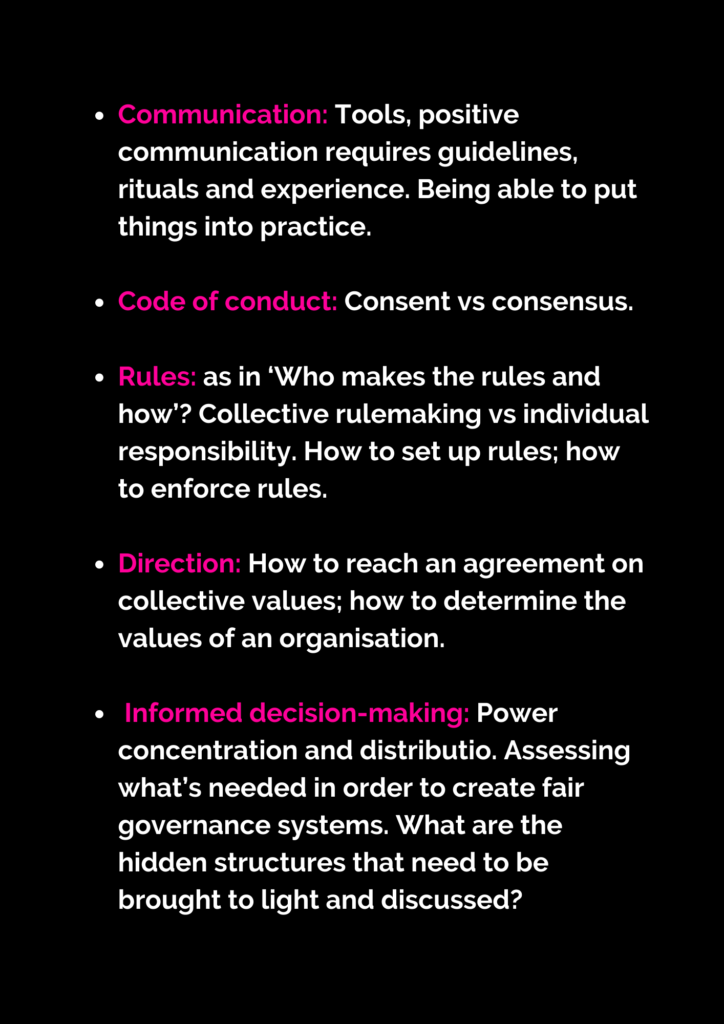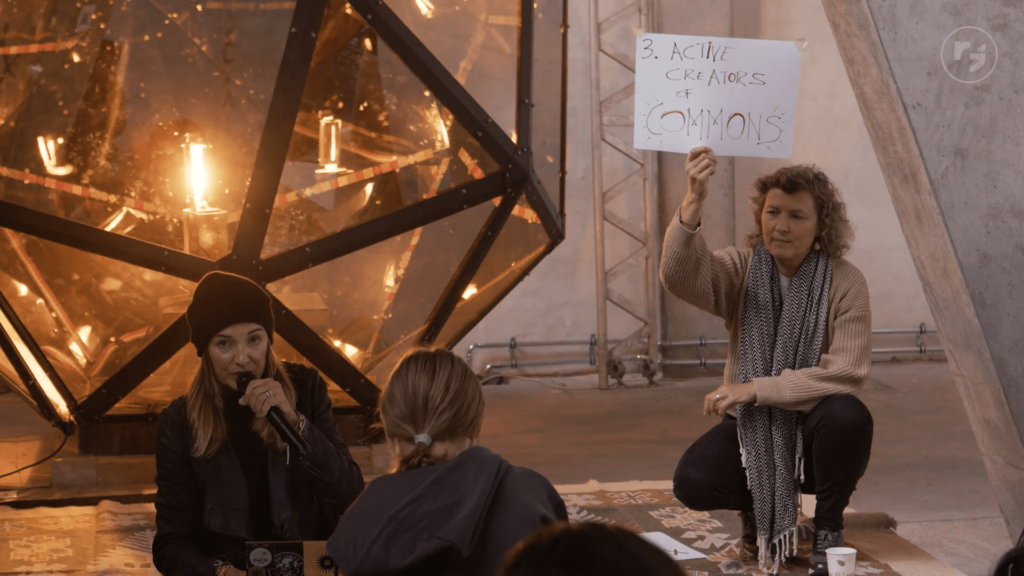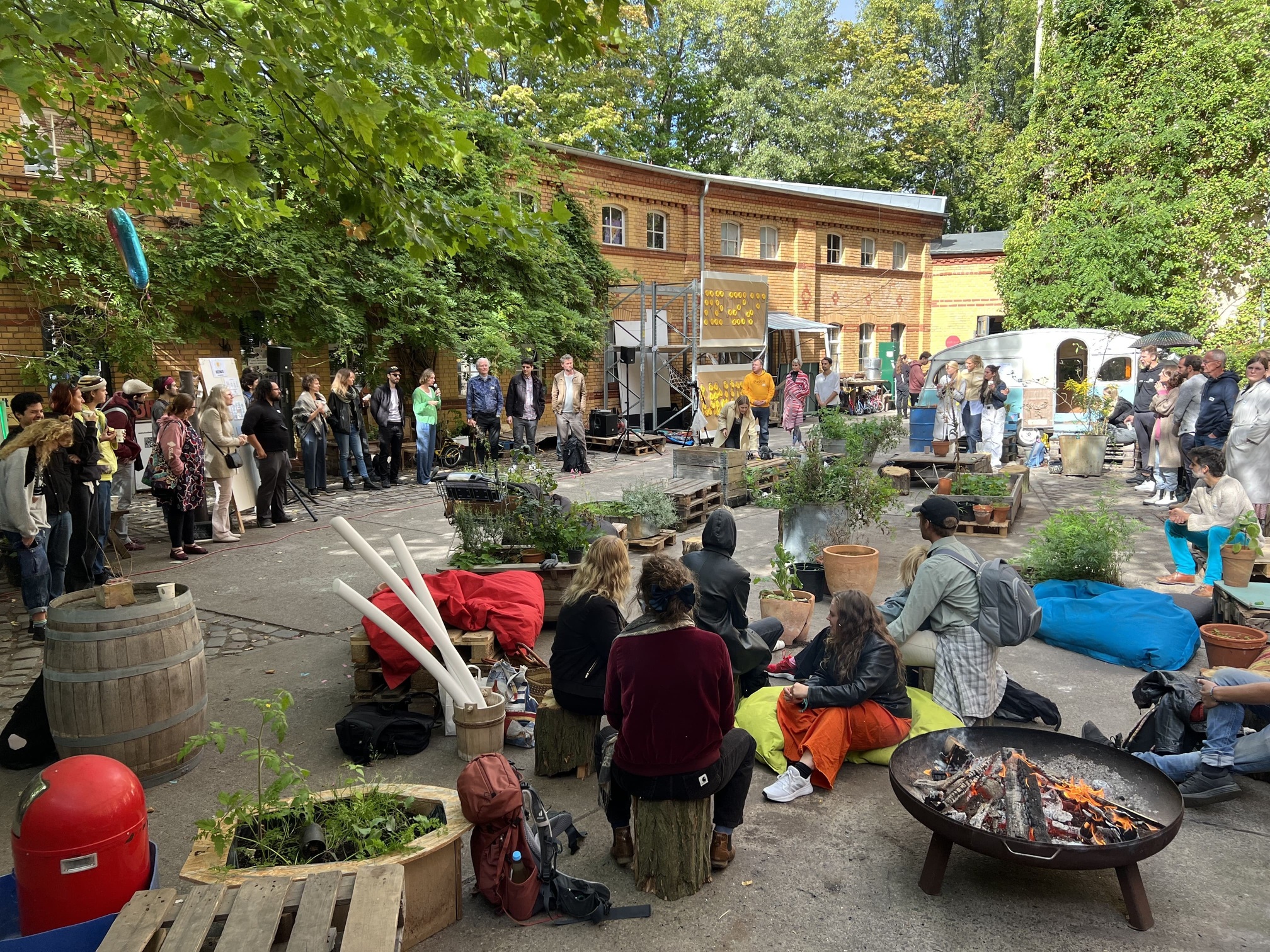As part of the Regens Unite Conference (September 16-17, 2022) in Berlin, Ela Kagel (SUPERMARKT Berlin & Platform Cooperatives Germany) and Irene Lopez de Vallejo (DisCO.Coop), offered a workshop on decentralised governance to the Regens community.
The main intention of this workshop was to provide a space to explore governance, its various meanings and ways of implementation. Workshop participants consisted of a wonderfully heterogeneous group of activists, artists, coders, Web3 enthusiasts and researchers, among others. We were so pleased to discover that every single attendee was interested in the conference’s main topics – building healthy cultures for regenerative organisations, alternative ownership models and equitable governance design, developing better tools, solutions & infrastructure for these models, ethical marketing and growth for good and regenerative practices for self-care. Best of all, they were especially keen on regenerating themselves and their own beliefs around collaboration and our collective ability to live and work sustainably.
Workshop part 1: What does governance mean to you?
Ela kicked off the workshop, taking place at the amazing Moos Space, with a wonderful reflection on the need for governance amongst self organised, commons-oriented communities. It does not matter what you are doing, whether building a community currency system, an urban garden, an artist community or an open-source Web3 protocol. When you practise community, at some point, the group will eventually feel and face a need to go beyond “no rules/spontaneous” self-organisation (aka ‘structurelessness’), to “let’s agree on some rules or die trying” (conflict resolution, anyone?) self-organisation.
So, the first question Irene and Ela gave the group of 30+ to chew on was: What does governance mean to you? You, as in your direct community; you as in your extended community?
Small groups of 3-4 gathered to discuss the question and come up with some keywords and if possible, “working definitions” around governance.

About 20 minutes later, the groups presented their reflections. These were based on their own experiences in existing collectives, or from doubts about implementing governance frameworks in groups already working on regenerative projects. We were impressed to see the level of thought put into the answers, and the common threads emerging and shared across the groups:
- The individuals and collectives present were very interested in the practice of governance and shared similar views and concerns towards its implementation;
- Different groups have very different starting points, hence there is no common portal for entering the governance debate;
- Depending on where people come from, the barriers of establishing self-determined governance frameworks are lower / higher and have to be addressed accordingly;
- Many people wondered: where does governance come from? Is there a common starting point, or is it rather a highly individualised experience? How to best begin the process of making rules and picking tools for a specific group’s decision-making?
- People agreed that good governance requires flexibility, and continuously emerges from healthy group practices;
- Governance is alive, not set in stone; it’s much more than a set of rules put down in bylaws or terms & conditions, but rather a practice that is based on continuous exchange and considerations for the needs of both people and organisations.
- Good governance is also possible within hierarchies, although horizontal patterns allow for better emergence;
- Governance tools are only as good as the human relations and practices they are being built on; trust is essential in these processes.
These shared ideas, doubts and barriers were followed by the key words, key concepts and working definitions of governance. To the question: What is governance? the groups responded: Governance is…


- Shared protocol: Shared usage, shared resources, co-creating a collaborative infrastructure.
- Code of conduct: Consent vs consensus (how do they differ?)
- Community care work: Building a framework for human interaction and social coordination that is inclusive, democratic and safe.
- Collective decision-making: The role of coordination, cultural agreements, collective sensemaking. Coming up with a set of protocols to capture people’s sentiment and will.
- Operational sensemaking as a continuous practice: Protocols of reorientation, collective navigation, agile adaptation. Building in iteration and constant development of rules and rituals.
- Communication: Tools and frameworks. Practising positive communication requires guidelines, rituals and experience. Again: consent vs consensus. Being able to put things into practice and implementing for communities of practice.
- Rules, as in ‘Who makes the rules and how’? Collective rulemaking vs individual responsibility. How to set up rules; how to enforce rules.
- Direction: How to come to an agreement on collective values; how to determine the values of an organisation.
- Informed decision making: Power concentration, power distribution and assessing what’s needed in order to create fair governance systems. What are the hidden structures that need to be brought to light? And be discussed?
It became clear that for most participants governance is still complex and definitely escapes being easily pinned down to a single notion, or even a clear collection of notions. Governance comes into play in all sorts of social, cultural, technological and market contexts, so understanding the actual context itself is a key element of being able to start any debate around the topic.
Workshop part 2: DisCO as a practical governance framework
Irene and Ela subsequently prepared participants for an introduction to a governance framework based on the lived experience of Guerrilla Media Collective. All these real-world learnings grew into a proposition for a new governance model, called DisCO, short for: Distributed Cooperative Organizations. DisCOs promote cooperative, commons-oriented and feminist ways of working together in teams. DisCOs describe themselves as distributed, rather than decentralised. Instead of focusing on autonomy, DisCOs strive towards cooperativism, and apply technology without being techno-centric. Mutual support and trust-based relationships are key. The DNA of DisCOs are conformed by The Commons, Open Coops, Open Value Accounting and Feminist Economics.

The 7 DisCO principles are formulated with these ideas and practices in mind:
- Values-based accountability
In DisCOs, production is explicitly guided by need, including social and environmental priorities. This orientation towards positive outcomes is the heart of a DisCO’s values.
- Building whole-community governance
Rather than restricting democratic principles to one organisation, DisCOs can extend rights of ownership and decision-making powers to those affected by a DisCO’s activities, specifically related to the degree of “stakeholder” involvement. This is context-dependent; a worker-owned cooperative DisCO will have a different stakeholder community than a non-profit form of DisCO, so there are many possible variations. The decision-making process is thus extended to:
- those who perform affective & reproductive labour
- suppliers, clients in contexts where their input is important (e.g. supply chain issues)
- neighbouring communities, backers (e.g. support for the DisCO’s proposed activities can be documented)
- Active creators of commons
DisCOs actively commit to generating decommodified, open-access resources, such as: infrastructures, knowledge (documentation, best practices), design, code.
4. Rethink global/local economiX
Physical production is kept local while knowledge, resources and values are shared globally with other DisCOs, for instance: FabLabs & Makerspaces, Guerrilla Media Collective’s “Think Global, Print Local” campaign.
- Care is core
DisCOs are living entities reflecting the values of its members, who need care and attention to maintain the health and well-being of the persons working there. Beyond individual members, DisCOs extend the notion of care work towards the collective as an entity represented by the upkeep of its goals and values.
- Reimagine the origin and flows of value
Three types of value — market value, commons-creating value, and care work value — are tracked through complementary metrics: Livelihood work, love work and care work.
- DisCOs are designed to be federated
DisCOs replicate through a standard federation protocol that allows critical mass without regimenting all parts.
The Q&A after Irene’s presentation was a rapid exchange of suggestions, clarifications and examples both requested by and brought generously forward by the different collectives present. The audience was very keen to hear about care practices, and how the collectives participating in the DisCO LABs programme approach them. Questions around the “how to” popped up from different people, so we gave examples coming from our daily practices in DisCO.coop, i.e. the Daily Check-in where each day, we respond to these five prompts:
Yesterday – what we did in terms of work on DisCO (this is our DisCO accountability bit, plus anything around that).
Today – how we’re feeling, how we’re showing up today.
Blocks – what’s standing in our way, if anything?
Well-being – what are we doing to care for ourselves?
Gratitude – let us know what you’re feeling grateful for today
Besides, we have our Mutual Support practices, where each month each of us are assigned another team member to talk to and support and viceversa, so we can understand what others in the team are feeling and going through, get to know them better and develop further trust within the group.
We also made clear that these practices are very specific to each group and can take different shapes and forms. For example, the Daily Check-in can have other points, less or more, be written or visual; mutual support structures can be structured on a one-to-one basis, or as “conga lines”, or specific “care squads” that tackle conflict when it arises using non-violent communication (NVC) practices; care practices can also be rotating activities nobody wants to do like cleaning common spaces, doing the administrative work that pretty much everybody dislikes…. Each community, each collective needs to decide what care practices are needed to sustain the health and well-being of the group and contribute to strengthening the trust relationships.
There were a few DisCO LABs and collectives very close to DisCO present at the workshop – Space of Urgency, ADAO, SecretDecks, Supermarkt, Circles – that took the floor to speak about some of their own experiences implementing the DisCO framework and starting the DisCO Journey.
We parted with the feeling that this is the future of work, that organisations and collectives that understand governance enabled by Web3 infrastructures can advance the path of regeneration of our societies, economies and ecologies, allowing us to be radically focused on what matters most to each of us: each other.
We are so grateful for the abundance of the attention and feedback provided by everyone present, and we invite you to watch the session recording, please share as widely and freely as you want.
Long live Regens Unite!!
_____________________________________________________________
Irene Lopez de Vallejo, PhD, is a member of the founding team of DisCO. Our mission is to bring the cooperative model into the 21st century, address the rise of ‘trustless’/dehumanising technologies, and consider technological (specifically blockchain) sufficiency. DisCO emboldens people towards creating economic counterpower in achievable ways through trusted groups that can compound into large-scale systemic change.
Ela Kagel is a digital strategist specialised in the intersection of society, technology and economy. Since the 1990s she has produced media art exhibitions, designed spaces for cultural exchange and helped establish digital platforms, networks and communities. In 2010 Ela co-founded SUPERMARKT, an independent hub for digital culture and collaborative economy.

